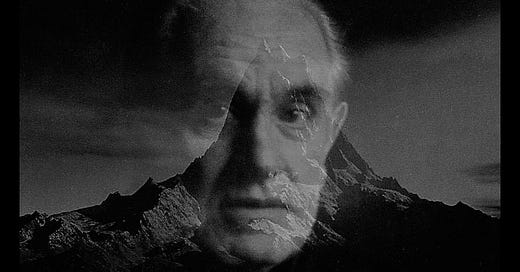PETER LEVENDA ON INNER TRADITIONS AND EVOLA
He felt he had to weigh in on this controversy (against his own better judgment!)
Right after I posted my comments on the Evola/Inner Traditions controversy, Peter Levenda weighed in with far more intellectual acumen than I could ever muster. The only problem was that he posted it on his own Facebook, thus limiting the potential reach of his laser-focused remarks.
Thankfully, Substack allows collaboration posts, and thus here’s Peter Levenda’s deconstruction of Inner Tradition's weak apologetics. Brace for impact.
By way of establishing my bona fides, I am the author of three books dealing specifically with Nazi occultism and the post-war Nazi underground and its influence on politics in the Americas, Europe, and Asia. I was also held at gunpoint at the Nazi enclave in Chile, Colonia Dignidad, by actual (World War Two) Nazis. It developed later that the Colony was not only a node in the right-wing terrorist project Operation Condor, but also a safe house utilized by members of what is popularly known as ODESSA.
There is no debate on these points. I have also confronted – and been confronted by – various neo-Nazis over the years, especially the National Renaissance Party of James Madole, which was focused on just the type of “esoteric Nazism” represented by Julius Evola.
I stand with Marco Visconti’s position on this episode, that there is nothing inherently wrong with publishing Evola. Marco has read Evola in the original; I have read the editions published by Inner Traditions in English translation. I also believe that Mein Kampf should be available in libraries, along with The Protocols of the Learned Elders of Zion and the anti-Semitic screeds of Henry Ford: the only American to be awarded Nazi Germany’s highest honor, and at the hands of Adolf Hitler himself. I believe these should be available so that future generations will not lie about their contents.
They should realize that the Protocols, for instance, represent an early modern attempt at “fake news” and disinformation, and that they originated with the Czarist secret police as a justification for continued pogroms against the Jews. Future generations should learn to recognize duplicity and deceit when they see it in textual form. Hence, my support of the publication of Evola’s writings.
I do not believe, however, that Mein Kampf or any of the above texts should be published in deluxe editions in slipcover cases, as if they were worthy of such consideration. Such a publishing strategy implies approval of and support for the author in excess of any normal standards of intellectual integrity. It’s not a good look. The medium, as McLuhan used to say, *is* the message.
The posted statement by Inner Traditions insults anyone with a historical background in this material. Their insistence that Evola was a “misunderstood” figure in the past as well as the present is simply too precious by half. The only ones misunderstanding Evola are precisely the editorial board at Inner Traditions, if this lengthy, self-serving statement is the best they can come up with.
Then, there is this:
We at Inner Traditions do not agree with all of Evola’s ideas. Further, Evola’s ideas developed from his earliest days as a Dadaist through his defense and promotion of the ideas of Tradition. We publish Evola because he is one of the most significant esoteric philosophers of the twentieth century and has left us a very important oeuvre.
Again, one is not arguing against publishing Evola. That was not the point, and to keep insisting on it is disingenuous, at the very least. His “significance” is debatable and is one of the issues that support the publisher’s insistence that Evola was “misunderstood.” I believe it is the publisher who is guilty of misunderstanding Evola’s “significance”. And of deliberately misunderstanding our objections to this newest publication and the marketing around it.
Be that as it may, what disturbs me most about the paragraph quoted above is the reference to Dadaism. That’s pretty rich. When Evola was residing comfortably in the embrace of the Sicherheitsdienst (the S.D., a branch of the S.S.) about which he often would brag in his post-war years (again, there is no debate here), his former colleagues in the Dadaist movement were being rounded up by the Nazis to be sent to the camps. It was only due to the dogged efforts of Valerian Fry that Max Ernst, Andre Breton, Marcel Duchamp, and many others who had formed the earliest Dada communities, which later became the Surrealist movement, managed to escape Europe for the West. (One of those who escaped with her life was Leonora Carrington, the much-celebrated Surrealist artist, who is enjoying something of a revival today.) Thus, to invoke Dada as if it was some kind of weird justification for Evola’s later “development” (or some kind of anti-cultural street cred) is an insult to the entire movement and to the memory of the people (and their art) his heroes were intent on destroying as he comfortably sat out the war.
Yet, as the publishers state, “Reading and understanding Evola is hard work.” Try harder, Inner Traditions. They state that his writings have been used by “extremists to further their vile and hateful actions” as if the fault does not lie in Evola’s own life and statements. In fact, the publishers have gone so far as to enlist Michael J. Moynihan as the editor of the series. (Seriously? Was Aleksandr Dugin not available? Alain de Benoist? Too bad Otto Skorzeny is no longer with us, right, guys?)
The statement goes on to include Professor Godwin’s statement about “banning books.” Again, take a breath. Inner Traditions has been publishing Evola for a long time. No one has objected before. We are objecting now because of the manner in which these writings are being presented and the lack of context in which they are being promoted.
Inner Traditions goes on to state:
The writings of the Ur Group are considered by many as some of the most significant to emerge from the 20th century.
Considered by whom? There was a lot of esotericism going on in the 20th century, a lot of significant groups and ground-breaking writings and research, in many countries, languages, and cultures. In what way does the Ur Group compare? If we are only talking about Traditionalism, then that might be your problem. I got yer Traditionalism right here.
Traditionalism is to the esoteric world what Christian Nationalism and white supremacy is to the political world. An exercise in selective memory, it invokes a time, a “Golden Age”, when the peasantry knew its place in the world, where slaves were slaves, and kings were righteous and queens kind and benevolent and dragons dared not leave their caves … in other words, a fairy tale.
This mindless, uncritical invocation of the Tradition is particularly dangerous today. Yes, as the publishers state, Evola was a “fierce and vocal critic” of the Modern World, as well he would be. There is no place for Evola and his Tradition of willful ignorance and prejudice in a world that is being torn apart by those whose egos are stoked by dreams of a resurgent (and largely imaginary) past. He has nothing to offer them but platitudes, and when they realize that their fascist emperor has no clothes they will turn on him as they did to Mussolini.
But by all means, let us sympathize with this poor, misunderstood genius whose history has been whitewashed by his followers. “He wasn’t really a Nazi …” they’ll say, ignoring the fact that the ones who were *really* not Nazis either left when they could or died in the camps. Evola did neither. He hid behind a degree of political ambiguity when it suited him and came out of the fascist closet when he was comfortable enough to do so.
I’ve met men like him, survivors of the War and the dragnets, who smile their crooked smiles when their past is brought up, when their hideous crimes are exposed, and protested that they really weren’t Nazis, or good Nazis, or influential Nazis, even as they cherish their photos of themselves in black uniforms and death’s head insignia.
They haven’t been able to do that with Martin Heidegger as much as they have tried. Or Werner Heisenberg. But they still try it with Evola because – unlike modern Western philosophy and nuclear physics – the field of esoterica is largely ignored on the world stage, and you can get away with it because no one is really looking. Except us.
If you want to understand the degree to which Evola’s philosophy is the gateway drug to a way of thinking that allows—even encourages—the Fascist mentality (capital “F” Fascist, as in orthodox Italian Fascism), then a study of his published works will help you. If you want to understand the mentality behind the sedevacantist movement in the Catholic Church, for instance, and the paranoid fantasies of an Archbishop Vigano, or the unhinged screeds of Aleksandr Dugin, or the smug villainy of a Steve Bannon or a Roger Stone, then by all means the writings of Evola and the other Traditionalists should be in your thesis bibliography. And if you want to understand what went wrong with much European and American esotericism, why Evola is as good a place as any to start.
But for the sake of all that is holy, do not do what Inner Traditions has done and provide a fawning justification for what is clearly a marketing mistake of serious proportions.
Ite, missa est.









